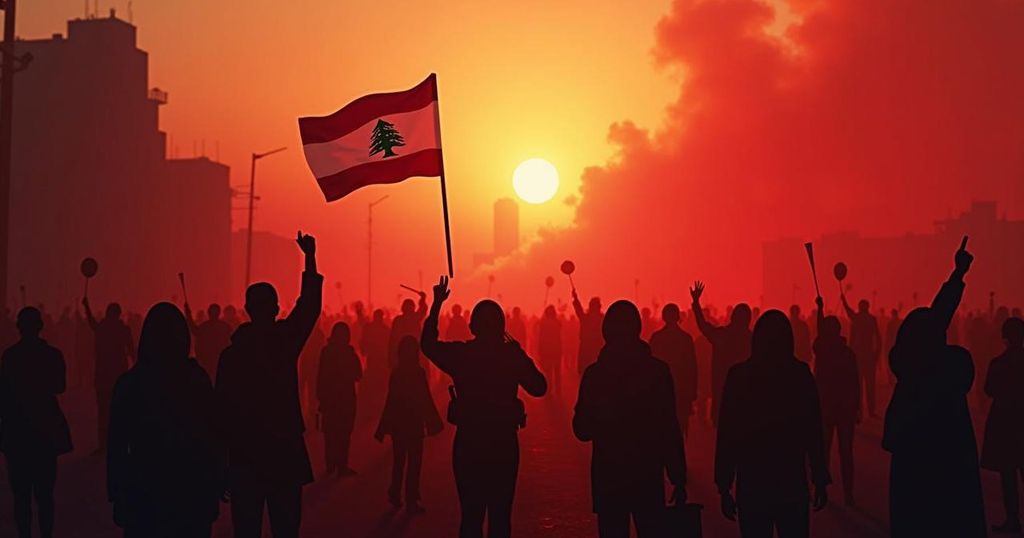Tens of thousands protested in Iran and Yemen against Israeli actions in Lebanon and Gaza, following calls by authorities to support Hezbollah. Demonstrators carried flags, chanted slogans, and denounced Israeli aggression, reflecting significant regional tensions amid ongoing conflict. In Bahrain, smaller protests expressed opposition to ties with Israel, emphasizing solidarity with the Palestinian cause.
On Friday, significant protests erupted across Iran and in the rebel-controlled Yemeni capital of Sanaa, where tens of thousands gathered to condemn Israeli military actions in Lebanon and Gaza, as reported by AFP correspondents and Iranian state media. These demonstrations were declared by Iranian authorities in solidarity with Hezbollah, emphasizing a collective denunciation of what they characterized as the “barbaric crimes of the Zionist regime in Palestine,” according to the official IRNA news agency. Hezbollah, a key player in what is termed the “axis of resistance,” which comprises Iran-aligned armed factions in the Middle East, has been directly engaged in hostilities against Israel and U.S. forces, especially in support of Hamas. The Yemeni Houthi rebels, also aligned with Iran, held their own substantial gathering in Sanaa, following a missile launch towards Israel the prior day. In Tehran, demonstrators congregated near Enghelab Square after Friday prayers, brandishing images of Hezbollah’s leader Hassan Nasrallah alongside flags representing Hezbollah and Palestine. Incendiary slogans such as “Israel is destroyed. Lebanon is victorious” resounded amid chants decrying the violence in Lebanon, leading to the burning of Israeli and U.S. flags. State television showcased similar actions in multiple Iranian cities, including Semnan, Qom, Kashan, Kermanshah, Shiraz, and Bandar Abbas. In Sanaa, the Houthi supporters displayed unwavering enthusiasm, with crowds waving rifles and banners. One supporter, Mortada al-Mutawkil, expressed solidarity with the Lebanese cause, stating, “We say to our brothers in Lebanon that you will be victorious, God willing.” Another participant, Mohammed Mushki, reinforced this sentiment by emphasizing unwavering Yemeni support for Lebanon and Palestine in their struggle against Israel. Contrastingly, in Bahrain, a close ally of Israel known for its strict control over public demonstrations, two protests took place denouncing the conflict in Gaza and the ongoing bombardments of Lebanon. Hundreds marched in a northern village, advocating for an end to ties with Israel and supporting the Palestinian and Lebanese causes, with chants demanding the cessation of normalization efforts with Israel. The backdrop of these protests is the recent escalation following Hamas’s assault on Israel on October 7, which instigated an ongoing conflict characterized by daily exchanges of fire between Hezbollah and Israeli forces. The recent Israeli incursions into Lebanon have resulted in unprecedented casualties, marking the most severe violence since Lebanon’s civil war from 1975 to 1990. Analysts suggest that Iran is negotiating a precarious balance, aiming to support Hezbollah while avoiding direct engagement in a wider conflict that could exploit its vulnerabilities.
The current protests are a reaction to increasing violence between Israeli forces and militant groups in Lebanon and Gaza, particularly against the backdrop of Hamas’s actions that commenced hostilities on October 7, 2023. The subsequent Israeli military campaigns have exacerbated tensions in the region. The influence of Iranian-backed Hezbollah and the Houthis has been significant in framing these protests, as they represent a unified front against perceived Israeli aggression. The situation is complicated by international relations, especially between Israel and its allies in the region, including Bahrain. Additionally, there is a historical context of hostility and conflict entrenched in the fabric of Middle Eastern geopolitics, particularly relating to Israel and Palestine.
The protests in Iran and Yemen underscore a broader regional sentiment against Israel amid escalating violence in Lebanon and Gaza. The demonstrations align with the objectives of Hezbollah and Iran, which seek to portray themselves as champions of the Palestinian cause. Concurrently, the protests reflect a rising discontent towards normalization with Israel, particularly in states like Bahrain. As the conflict evolves, it is evident that the risks of broader regional instability remain high, with Iran navigating its strategic interests without directly inciting an all-out confrontation.
Original Source: www.france24.com






